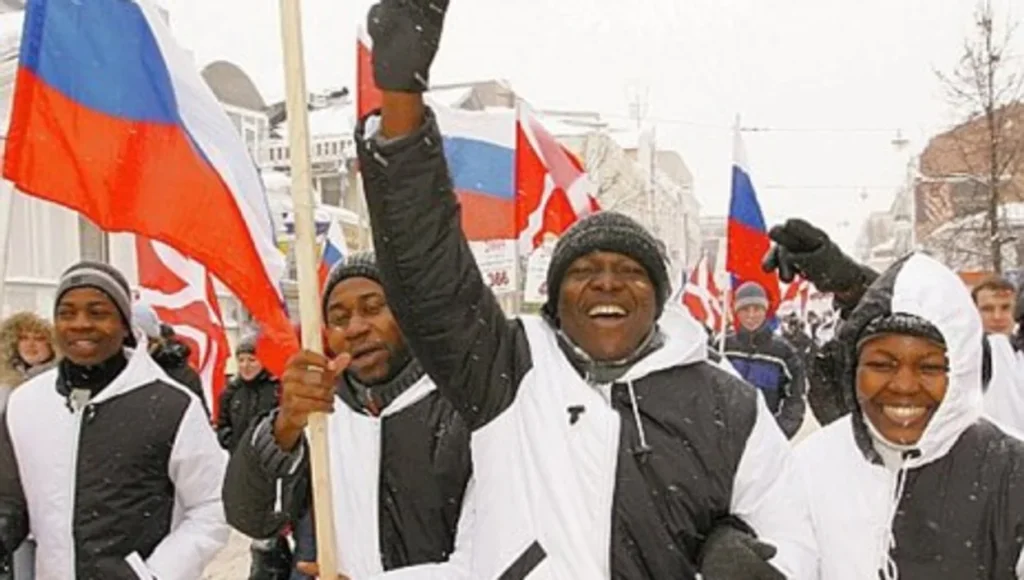
On October 15, 2024, the Russian Embassy in Nairobi announced a scholarship initiative targeting Kenyan students pursuing higher education. This comprehensive scholarship package covers tuition, living expenses, and language training to prepare students for academic success in Russia. Russia’s strategic investment in Kenyan students echoes the goals of established U.S. educational programs like the Fulbright Foreign Student Program and the Mastercard Foundation Scholars Program, both aimed at empowering African students. This article delves into Russia’s educational outreach and its implications for Kenya-Russia relations, comparing it to U.S. programs and their long-standing influence.
The Russian Scholarship Program: A New Avenue
The Russian Embassy’s scholarship program offers fully funded opportunities to Kenyan students at the undergraduate, Master’s, and Ph.D. levels in fields such as Earth Sciences, Computer Science, Medicine, and Political Science. Students can apply until December 2024 through Russia’s educational portal, where they submit required documents, including academic transcripts and a portfolio.
This initiative marks part of Russia’s expanding educational diplomacy in Africa, focusing on fields of high demand. Beyond academic training, the program emphasizes cultural immersion, requiring students to learn Russian—a component supported by the Russian Center for Open Education in Nairobi, which offers free language courses. This structure reflects Russia’s ambition to forge lasting educational and professional ties with Kenya, positioning itself as a long-term partner in African nations’ academic and technical development.
A Diplomatic Undertone: Implications for Kenya-Russia Relations
Russia’s scholarship program is part of a broader foreign policy to strengthen diplomatic and economic ties with Africa. Russian officials emphasize the role of educational collaboration as a pathway to deeper partnerships. Over recent years, Russia has increased its scholarship allocations for African students by 150%, from 1,700 in 2020 to 4,700 in 2024.
Russia’s educational initiatives in Kenya align with other diplomatic measures, including professional training and scientific cooperation. By equipping Kenyan students with expertise relevant to Russian industries, Russia is positioning itself as a critical ally in Kenya’s development. The program offers Kenyan students unique access to an advanced education while integrating them into a professional network with ties to Russian academia and industry.
Comparing with U.S. Opportunities: Fulbright and Mastercard Foundation Programs.
The U.S. has long utilized the Fulbright Foreign Student Program and the Mastercard Foundation Scholars Program to build educational bridges with Africa. Established in 1946, the Fulbright Program supports postgraduate studies across various fields and promotes cross-cultural understanding through academic exchange. It provides full tuition coverage, living expenses, health insurance, and travel costs, with a selection process emphasizing academic performance, leadership, and community engagement.
The Mastercard Foundation Scholars Program partners with universities to support African students pursuing undergraduate and graduate degrees. Focusing on leadership, social impact, and career development, it prepares scholars to drive change across Africa. Partner universities, including Arizona State University and McGill University, offer comprehensive support, career guidance, and resources to help students transition from academia to impactful careers.
While similar in objectives, U.S. and Russian programs diverge in certain aspects. U.S. programs primarily operate in English and prioritize interdisciplinary research and global networking, with extensive alumni networks offering professional international relations and public health connections. Russian scholarships, by contrast, emphasize specific technical fields and involve immersive cultural exchange, potentially offering more tailored expertise for students interested in Russian industry.
Why Now? Russia’s Growing Focus on African Education
Russia’s recent push for educational diplomacy across Africa aligns with its strategic vision to cultivate influence on a continent with a critical position in global power dynamics. Russia extends its influence beyond academics by offering scholarships, language training centers, and university partnerships to establish long-lasting cultural connections. This “knowledge diplomacy” aims to reshape African higher education, especially in technical areas where skill gaps are most pronounced. These educational collaborations promise more than academic achievements—they offer a foundation for future partnerships in science and industry. Russia’s expanding role presents itself as an alternative to traditional Western educational partners, positioning itself as a committed ally in knowledge exchange and growth.
The Impact for Kenyan Students: Which Path to Choose?
For Kenyan students, choosing between Russian and U.S. scholarships presents two distinct paths to global education. Key considerations include language requirements (Russian vs. English), areas of specialization, and potential career benefits. Russian scholarships focus on technical fields like mineral resources, medicine, and technology, where Russian expertise is solid. U.S. programs offer broader interdisciplinary exposure and access to international networks.
The Russian option allows students to engage deeply with Russian culture and become part of a network of Russian-educated professionals, potentially leading to future collaborations in Russian industries. Meanwhile, U.S. programs provide robust mentorship, extensive resources, and global networks, benefiting public health, international relations, and social sciences careers. Kenyan students are encouraged to consider how each option aligns with their long-term aspirations and the professional environments they aim to enter.
Expanding Horizons for Kenyan Students
With the evolving landscape of educational diplomacy, Russia’s fully-funded scholarships provide Kenyan students with additional avenues for higher education and international experience. This influx of opportunities signifies a crucial moment for students who face barriers to achieving educational goals. It grants access to diverse academic programs, challenging the conventional options provided by the U.S. and opening doors for broader academic and professional endeavors.
The increased availability of scholarships offers more than educational advancement—it’s a transformative shift for Kenyan students and their families, allowing them to weigh the benefits of both Russian and U.S. offerings carefully. For many students who once saw studying abroad as an unattainable dream, these new options make that goal a viable reality. This shift doesn’t just grant access to degrees; it prepares a generation of Kenyan students to step confidently onto the global stage, equipped to contribute to their communities and beyond.
